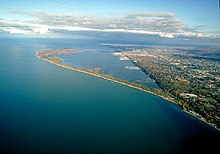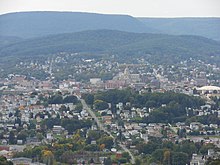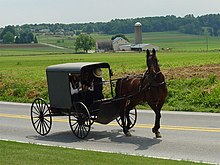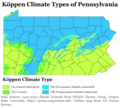The US FDA’s proposed rule on laboratory-developed tests: Impacts on clinical laboratory testing
The Pennsylvania Portal Pennsylvania (/ˌpɛnsɪlˈveɪniə/ ⓘ PEN-sil-VAY-nee-ə, lit. 'Penn's forest country'), officially the Commonwealth of Pennsylvania (Pennsylvania Dutch: Pennsilfaani), is a U.S. state spanning the Mid-Atlantic, Northeastern, Appalachian, and Great Lakes regions of the United States. It borders Delaware to its southeast, Maryland to its south, West Virginia to its southwest, Ohio and the Ohio River to its west, Lake Erie and New York to its north, the Delaware River and New Jersey to its east, and the Canadian province of Ontario to its northwest via Lake Erie. Pennsylvania was founded in 1681 through a royal land grant to William Penn, the son of the state's namesake. Before that, between 1638 and 1655, a southeast portion of the state was part of New Sweden, a Swedish colony. Established as a haven for religious and political tolerance, the colonial-era Province of Pennsylvania was known for its relatively peaceful relations with native tribes, innovative government system, and religious pluralism. Pennsylvania played a vital and historic role in the American Revolution and the ultimately successful quest for independence from the British Empire, hosting the First and Second Continental Congress in Philadelphia that formed the Continental Army and appointed George Washington as its commander in 1775, and unanimously adopted the Declaration of Independence the following year. On December 12, 1787, Pennsylvania was the second state to ratify the U.S. Constitution. (Full article...) This is a Featured article, which represents some of the best content on English Wikipedia..
Presque Isle State Park (/prɛsk/ PRESK) is a 3,112-acre (1,259 ha) Pennsylvania State Park on an arching, sandy peninsula jutting into Lake Erie, 4 miles (6 km) west of the city of Erie, in Millcreek Township, Erie County, Pennsylvania, in the United States. The peninsula sweeps northeastward, surrounding Presque Isle Bay along the park's southern coast. It has 13 miles (21 km) of roads, 21 miles (34 km) of recreational trails, 13 beaches for swimming, and a marina. Popular activities at the park include swimming, boating, hiking, biking, and birdwatching. The recorded history of Presque Isle begins with the Erielhonan, a Native American tribe who gave their name to Lake Erie, and includes French, British, and American forts, as well as serving as a base for Commodore Oliver Hazard Perry's fleet in the War of 1812. With the growing importance of shipping on Lake Erie in the 19th century, Presque Isle became home to several lighthouses and what later became a United States Coast Guard station. In 1921, it became a state park, and as of 2007 it hosts over 4 million visitors per year, the most of any Pennsylvania state park. (Full article...) Selected geography article -Altoona (/ælˈtuːnə/ al-TOO-nə) is a city in Blair County, Pennsylvania, United States. The population was 43,963 at the time of the 2020 census. It is the principal city of the Altoona metropolitan area, which includes all of Blair County and was recorded as having a population of 122,823. Altoona was established in 1849 by the Pennsylvania Railroad. Having grown around the railroad industry, the city has worked to recover from industrial decline and urban decentralization experienced in recent decades. The city is home to the Altoona Curve baseball team of the Eastern League, which is the AA affiliate of the Pittsburgh Pirates Major League Baseball team. They play at Peoples Natural Gas Field in Altoona. The Altoona Symphony Orchestra has called Altoona home since 1928. Prominent landmarks include the Horseshoe Curve, the Railroaders Memorial Museum, the Juniata Shops of the Altoona Works, the Mishler Theatre, the Cathedral of the Blessed Sacrament, and the Jaffa Shrine Center. (Full article...) Selected image -Did you know -
Related portalsWikiprojectsThis is a Good article, an article that meets a core set of high editorial standards.
 Randolph Frederick Pausch (/paʊʃ/) (October 23, 1960 – July 25, 2008) was an American educator, a professor of computer science, human–computer interaction, and design at Carnegie Mellon University (CMU) in Pittsburgh, Pennsylvania. Pausch learned he had pancreatic cancer in September 2006. In August 2007, he was given a terminal diagnosis: "three to six months of good health left". He gave an upbeat lecture titled, "The Last Lecture: Really Achieving Your Childhood Dreams" on September 18, 2007 at Carnegie Mellon, which became a popular YouTube video and led to other media appearances. He co-authored a book of the same name, The Last Lecture, which became a New York Times best-seller. (Full article...) Selected article -The Amish (/ˈɑːmɪʃ/ ⓘ, also /ˈæmɪʃ/ or /ˈeɪmɪʃ/; Pennsylvania German: Amisch; German: Amische), formally the Old Order Amish, are a group of traditionalist Anabaptist Christian church fellowships with Swiss and Alsatian origins. As they maintain a degree of separation from surrounding populations, and hold their faith in common, the Amish have been described by certain scholars as an ethnoreligious group, combining features of an ethnicity and a Christian denomination. The Amish are closely related to Old Order Mennonites and Conservative Mennonites, denominations that are also a part of Anabaptist Christianity. The Amish are known for simple living, plain dress, Christian pacifism, and slowness to adopt many conveniences of modern technology, with a view neither to interrupt family time, nor replace face-to-face conversations whenever possible, and a view to maintain self-sufficiency. The Amish value rural life, manual labor, humility and Gelassenheit (submission to God's will). The Amish church began with a schism in Switzerland within a group of Swiss and Alsatian Mennonite Anabaptists in 1693 led by Jakob Ammann. Those who followed Ammann became known as Amish. In the second half of the 19th century, the Amish divided into Old Order Amish and Amish Mennonites; the latter do not abstain from using motor cars, whereas the Old Order Amish retained much of their traditional culture. When people refer to the Amish today, they normally refer to the Old Order Amish, though there are other subgroups of Amish. The Amish fall into three main subgroups—the Old Order Amish, the New Order Amish, and the Beachy Amish—all of whom wear plain dress and live their life according to the Bible as codified in their church's Ordnung. The Old Order Amish and New Order Amish conduct their worship in German, speak Pennsylvania Dutch, and use buggies for transportation, in contrast to the Beachy Amish who use modern technology (inclusive of motor cars) and conduct worship in the local language of the area in which they reside. Both the New Order Amish and the Beachy Amish emphasize the New Birth, evangelize to seek converts, and have Sunday Schools. (Full article...) Pennsylvania news
CategoriesState factsState Facts
State symbols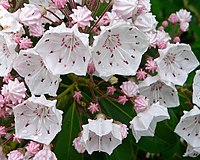
Pennsylvania topicsGeneral imagesThe following are images from various Pennsylvania-related articles on Wikipedia.
Associated WikimediaThe following Wikimedia Foundation sister projects provide more on this subject:
Discover Wikipedia using portals
|
















